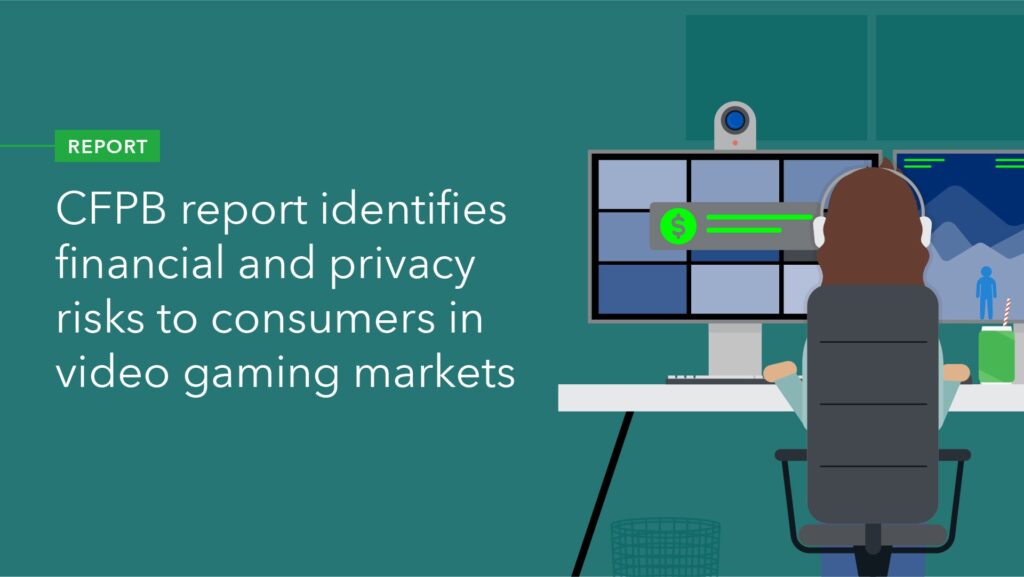Washington DC – Today, the Consumer Financial Protection Bureau (CFPB) released a report examining the growth of online video games and financial transactions in virtual worlds. These platforms increasingly resemble traditional banking and payment systems, facilitating the storage and exchange of billions of dollars of assets, including cryptocurrencies. However, consumers report falling victim to fraud and theft on gaming platforms and not receiving the protections they expect under federal law. The CFPB will monitor markets in which financial products and services are offered, including video games and virtual worlds, to ensure compliance with federal consumer financial protection laws.
“Americans of all ages exchange billions of dollars into currencies used in virtual reality and gaming platforms,” said CFPB Director Rohit Chopra. “As more banking and payment activities take place in video games and virtual worlds, the CFPB is considering ways to protect consumers from scams and scams.”
This report, Banking in Video Games and Virtual Worlds, examines the growing use and scale of these assets across the gaming industry, the associated risks to consumers, and the evolution of gaming and virtual worlds into online markets. doing. U.S. consumers spent approximately $57 billion on games in 2023, including hardware, software, and in-game transactions such as converting dollars into virtual currency and other game assets. These assets are often bought, sold, and traded on virtual markets, allowing gaming companies to recreate everyday activities online, including financial payments.
This report identifies a number of trends and risks related to gaming assets, including:
- Gaming products and services are similar to traditional financial products. Games and virtual worlds allow players to store and transfer valuable assets, including in-game currency and virtual items such as cosmetic skins and collectibles. For example, the highest reported sale of cosmetic skins was $500,000. Games and virtual worlds act as real-world marketplaces that allow players to store and transfer valuable assets. To leverage that value, gaming companies are starting to incorporate financial products and services such as their own payment processors and money transfer machines.
- Game companies offer little customer support if consumers suffer financial harm: The rising value of in-game assets has led to an increase in fraud, phishing, and account theft. Attackers use phishing tactics and compromised user credentials to infiltrate accounts, gain access to game currency and virtual items, and sell these assets off the platform for other currencies. Consumers report that they have little recourse from game companies in the event of a loss, and game publishers are forced to take action against them, including if their game's service is suspended or a consumer's account is closed. It claims there is no obligation to compensate players for financial losses.
- Gaming companies are collecting gamers' personal and behavioral data: Publishers collect large amounts of data about players, including financial data, purchase history, behavioral details such as spending thresholds. Gaming platforms can also track player location data, which can generate an accurate picture of a player's daily life, such as their home address, place of work or worship, and health and medical conditions. . Additionally, with the advent of virtual reality and mixed reality gaming, the information collected by headsets may include biometric data such as iris scans, eye movements, pupil responses, and gait analysis, leading to medical privacy concerns. may pose a risk.
The CFPB receives consumer complaints about hacking attempts, account theft, and loss of access to gaming assets. Among complaints, most consumers reported receiving limited support from gaming companies, including refunds and security improvements. Current consumer protection laws apply to banking and payment systems that facilitate the storage and exchange of valuable assets. The CFPB monitors markets where financial products and services are offered, such as video games and virtual worlds.
read the report, Video games and banking in the virtual world.
Read Secretary Chopra's statement on this report.
Consumers can file complaints about financial products or services by visiting the CFPB's website or by calling (855) 411-CFPB (2372).
Employees of companies that believe their companies are violating federal consumer financial laws are encouraged to send information they know to whistlebwer@cfpb.gov.
The Consumer Financial Protection Bureau is a 21st century agency that enforces and enforces federal consumer financial laws and ensures that the markets for consumer financial products are fair, transparent, and competitive. For more information, please visit: www.consumerfinance.gov.


